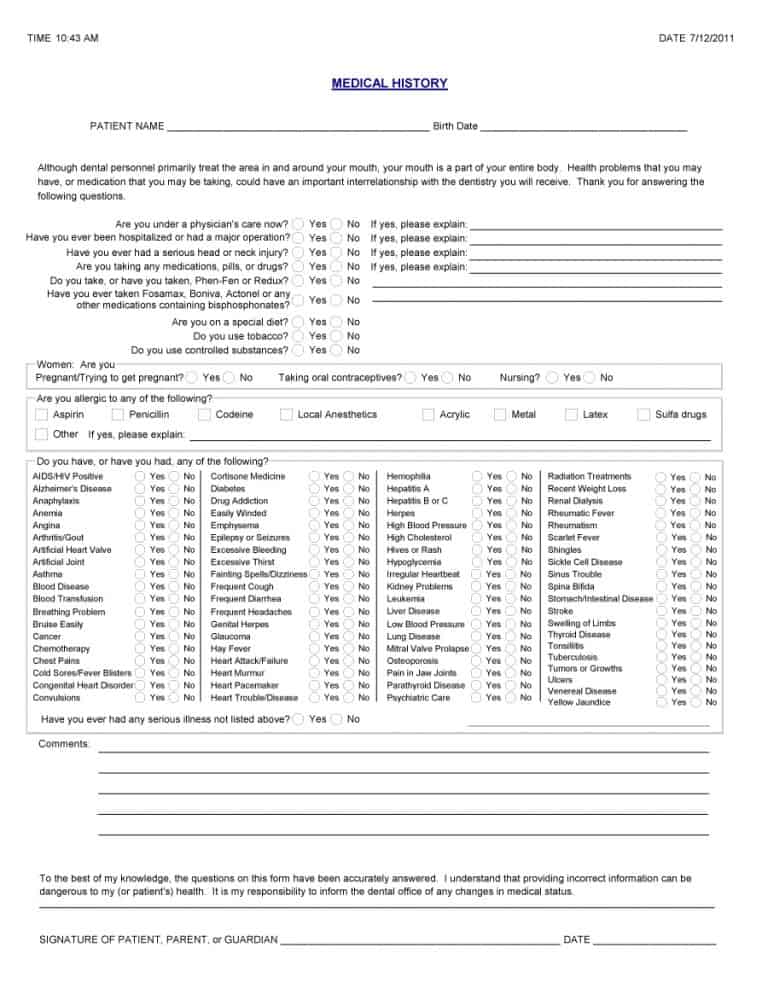A medical history form is a document that provides essential information regarding a patient’s health history. This information helps doctors and healthcare professionals understand the patient’s medical background when creating a diagnosis, medication plan, and, more importantly, a treatment plan.
Medical History Forms
A medical history form is essential for practically everyone seeking medical care. It is a document that contains a list of questions about the patient’s health history, family history, habits, and any previous or current medical conditions. This form goes beyond the present acute illness because it also includes the patient’s past illnesses and the health status of their family members. Therefore, it provides critical information that helps doctors and medical professionals provide the best possible care.
There are many different types of medical history forms available on the market. Some medical facilities have their customized forms, while others utilize standard templates. These forms are available for printing, downloading, and filling out electronically.
Why are Medical History Forms Important?
 Medical history forms are essential for a variety of reasons; however, here are some of the primary functions of these forms.
Medical history forms are essential for a variety of reasons; however, here are some of the primary functions of these forms.
Assessing the Patient’s Health Status
By filling out a medical history form, patients provide critical information that helps doctors assess their present and future health status. This information can include vaccinations, allergies, medical diagnoses, and surgeries, among others. By completing these forms, patients are on a path to receiving informed medical care.
Preventing Medical Errors
Medical errors can be fatal, and many can be prevented. By having accurate and detailed medical history forms, healthcare professionals can reduce the likelihood of errors occurring. These forms also enable healthcare professionals to keep track of medications, allergies, and previous illnesses, among other factors.
Fostering Doctor-Patient Communication
Medical history forms can help foster communication between patients and their doctors. A detailed history can help doctors understand their patients’ health concerns and create a plan that suits their unique needs.
What Information is included in a Medical History Form?
 Medical history forms contain many different sections. Generally, the forms include the following sections:
Medical history forms contain many different sections. Generally, the forms include the following sections:
Patient Information
This section normally includes the patient’s name, address, phone number, and email address.
Medical History
Patients must provide detailed information about every medical condition they have or had in the past. This information includes diagnosis, current and past treatments, and any surgeries and hospitalizations. The history of allergies to medications and substances, such as peanuts or bee stings, is also included in this section.
Family History
Patients must provide the medical history of close family members, including their parents, siblings, grandparents, and children. This information allows healthcare professionals to identify potential genetic risks and other medical conditions.
Social History
Patients must provide information about their lifestyle choices, such as smoking, drinking, and drug use. This information is critical for doctors who are planning treatment as it can affect the effectiveness of drugs or cause harmful side effects.
Medications and Supplements
Patients must identify all prescription and non-prescription drugs, vitamins, and supplements they are currently taking. The information provided should include the dosage and frequency of use. This information helps healthcare professionals identify any medication interactions that could be harmful to the patient.
Conclusion
 Medical history forms provide healthcare professionals with valuable information that helps them provide patients with the best possible care. It is vital to complete them accurately and honestly to ensure safety when receiving treatment. Medical history forms make a significant impact on patient safety, quality of care, and outcomes.
Medical history forms provide healthcare professionals with valuable information that helps them provide patients with the best possible care. It is vital to complete them accurately and honestly to ensure safety when receiving treatment. Medical history forms make a significant impact on patient safety, quality of care, and outcomes.